#I tried to give them some Beatrice Potter vibes
Explore tagged Tumblr posts
Text
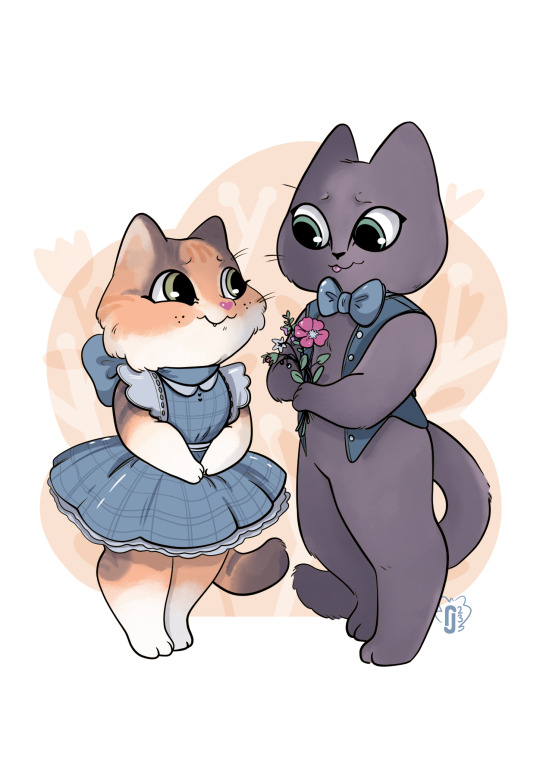
Oh yeah! Something a little bit different than usual that I can finally post!
I got the privilege of doing this very sweet commission for my dear friends @lesbrarians and @the-werewolf-queen of their cute kitties, Peebee and Grizzy as little cottagecore anthro cats!
Look at them! I had so much fun with this, thank you for the opportunity to draw your babies! 🐱
#Anthro cats#commissions#Cottagecore#I tried to give them some Beatrice Potter vibes#I love them so much
47 notes
·
View notes
Text
Chapter 6: Lullaby in Frogland
Let’s look back. Way back. Back before the dawn of animation, before the dawn of film, well before Ruby or Spears or Disney or Iwerks or either Fleischer Brother. Back to 1835, in a town named Florida in a state named Missouri when a boy named Samuel was born.
Like Ub Iwerks, Sam was raised in Missouri. And like Max Fleischer, Sam’s family took a financial hit when his father’s work stopped (this time due to a premature death rather than the decline of tailory), giving Sam a practical approach to employment. He left school at age eleven to become a printer’s apprentice, then moved to his older brother’s newspaper as a typesetter and occasional columnist, writing humorous articles and drawing cartoons. But unlike Beatrix Potter or the animators we’ve covered, visual art wasn’t in the cards for Sam.
He moved to the East Coast to work for other papers, bouncing between cities before returning to the midwest to embark on a career he’d dreamed of since he was old enough to dream: piloting a steamboat. He thrived on the water, and kept writing about his work along the river, but everything stopped when the Civil War closed off the Mississippi. So Sam headed west to work for the same brother who once ran the newspaper, now a politician in Nevada (I’d be remiss if I didn’t point out that this brother was for some reason named Orion). Sam tried mining, and it didn’t take, but he’d gotten pretty good at writing and set off for San Francisco to get back into his jocular brand of journalism.
It was here that he had his first success, a short story published in his paper called Jim Smiley and His Jumping Frog. But, like a certain frog we’ve covered in this series, Sam wasn’t huge on permanent names. Within a month, the story was reprinted as The Celebrated Jumping Frog of Calaveras County, and Jim Smiley’s name was changed to Jim Greeley. Until the book version came out, when it was changed back to Jim Smiley. And this whole time, within the story, it’s a mystery whether Jim’s real name is actually Leonidas (it turns out that it isn’t, but it might be). None of this should come as a surprise for Samuel Clemens, who wrote under the names of Josh, Thomas Jefferson Snodgrass, and most famously, Mark Twain.
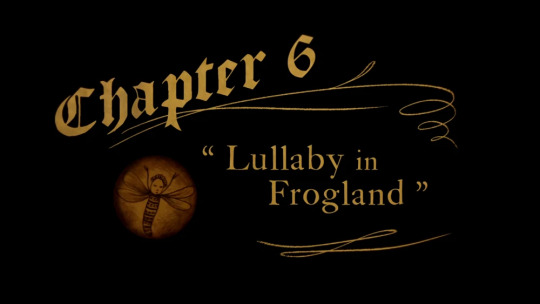
“I knew you were special.”
Over the Garden Wall is, among other things, a story about the importance of solid communication. After five episodes spent building up our heroes as a group of friends, all it takes is one episode of terrible communication to throw it all away. The specific issues vary, despite leading to a similar result of not verbalizing their thoughts very well: Greg’s youth stops him from articulating his rapidly changing ideas, Wirt’s anxiety leaves him too timid to speak up or too rambling to be clear, Beatrice’s true intentions make her obfuscate the truth, and Jason Funderburker straight-up can’t talk. Or so we think.
This time he’s named for American statesmen George Washington and Benjamin Franklin, which fits the continuing vintage Americana vibe of the series—while I figure it’s a coincidence, it should be noted that Mark Twain’s Jumping Frog was named after American statesman Daniel Webster. Surrounded by other frogs that walk around and wear fancy garb, our frog is more anthropomorphic than ever, standing on his hind legs and dancing along with Greg. But it’s still a shock to hear him open his mouth and sing, a shock that soon cedes to the realization that the frog playing the piano at the beginning of the series is singing the Jack Jones song in the montage that follows.
Lullaby in Frogland is Jason Funderburker’s episode through and through, so much so that it’s the first time we hear of his namesake, Jason Funderberker. This is an episode where Wirt rejects Greg’s assertion that their frog is “our frog,” a plot point that’s paid off in their last conversation in the series. This is an episode where Greg wonders aloud if he can be a hero, sees the frog set off on a diverging path immediately afterwards, and accepts it, because he’s willing to sacrifice his happiness for the good of others. And it’s an episode where the frog returns after a harrowing betrayal, showing that even when all seems lost, there’s still room for hope. Over the Garden Wall (the song) might not sound like a traditional lullaby, but it soothes us into a cold night as the sun sets on the first half of Over the Garden Wall (the show).
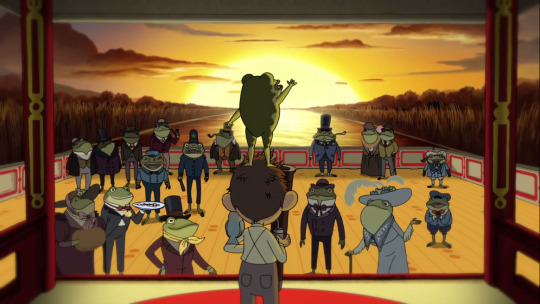
Adelaide’s true nature is foreshadowed by Beatrice’s sudden hesitance to bring the brothers to the pasture after several episodes of nagging, but the twist is made tragic by Wirt finally letting his guard down enough to be happy. He sings a completed Adelaide Parade with Greg and joins the dance before collapsing into the most earnest laughter I’ve ever heard in a cartoon. He’s a good enough friend to notice when Beatrice is “uncharacteristically wistful,” and takes a risk by playing the bassoon instead of just giving up. He’s still got growing to do—it’s one thing to blame Greg for getting them in trouble by throwing away the ferry fare and forcing them to sneak aboard, but another thing to literally shout “Take him, not me!” when confronted by the frog fuzz—so it’s clear that his journey isn’t over yet, but he doesn’t even get a full episode of peace before everything blows up.
The whole steamboat sequence flows between simple delights, like saluting the captain mid-chase, the revelation that the frogs love music more than they hate trespassers, and the repeated gags of three gentlemen frogs snatching up flying flies and a frog mother dropping her tadpoles. Everything just feels calm, even when antics are afoot. Wirt gets to save the day with his bassooning, Greg gets to feel rewarded in his knowledge that his frog is special, Jason gets to sing a song after being silent throughout the series, and Beatrice seems, for now, to come to a sort of peace about things after several clear attempts to sidetrack the boys. This is the only episode to feature two major stories instead of one, but the steamer segment is rich enough to feel like a full episode. If only we could’ve stopped here.

All roads lead to Twain when it comes to depictions of steamboats as a go-to American icon, which is why he preceded this discussion of Lullaby in Frogland: I’m not claiming Mickey Mouse wouldn’t have been successful if his first cartoon was about something else, but I’m certainly claiming that we wouldn’t have gotten Steamboat Willie as it was if Ub Iwerks hadn’t grown up in a Missouri whose lore was shaped by Twain’s tales of the river. But while the author is the root of the episode’s many influences, I think the most fascinating branch that we borrow from is The Princess and the Frog.
2009 was a great year for animation, seeing the release of Coraline, Fantastic Mr. Fox, The Secret of Kells, the surprisingly great Cloudy With a Chance of Meatballs, and the first ten minutes of Up (also the rest of Up, if I’m feeling generous). The first two on that list are my favorite of the year, twin stop-motion masterpieces that I’m always in the mood to watch, but The Princess and the Frog is a brilliant last gasp from Disney’s 2D animation studio. It isn’t the final traditionally animated film they made (that would be 2011′s Winnie the Pooh), nor the final fully sincere princess movie they made (that would be 2010′s Tangled), but it marks the beginning of the end for both trends: for better and worse, modern Disney animation feels the need to loudly subvert old tropes and wouldn’t be caught dead in two dimensions.
Lullaby in Frogland’s connection to The Princess and the Frog is certainly visible on the surface level: both feature a long sequence starring frogs on a steamboat where a lead character must pretend to be another animal and play a woodwind instrument to get out of a jam, and both involve our heroes seeking help from a wise woman far from civilization (even if only one of these women is actually helpful). But it’s the somber nostalgia factor that binds these stories closer than anything, the knowledge that this is the end of the road for this type of tale. The ferry’s gotta land somewhere, and the cold is setting in as the frogs begin hibernating for the winter, but there’s still more story to tell.
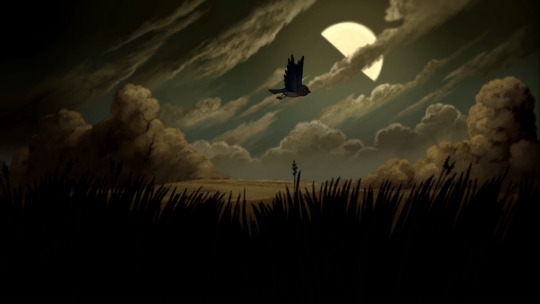
The second story of Lullaby in Frogland is scored throughout by a haunting string and piano rendition of Adelaide Parade, and Adelaide herself is immediately captivating. John Cleese returns for the second episode in a row, but as both of these episodes aired the same night, it feels like a consistent through-line: in the first half, he’s an eccentric who might be a deranged maniac but is actually harmless, and now he’s a witch who might be harmless but is actually a deranged maniac.
Adelaide gets a compelling amount of detail for someone who’s barely in the show. We don’t get any explanation about her fatal weakness to...fresh air? Coldness in general? Either way, like the Wicked Witch of the West’s lethal reaction to water, it’s absurd that someone like her has managed to live this long. She never says what she needs a child servant for, why she has scissors that seem custom-made for Beatrice’s specific curse, or what her spider-like deal with yarn and wool is (she has a black widow hourglass on her back, but also reminds me of the Greek Fates with her emphasis on thread). We never find out how she’s connected to the Beast, whose theme bleeds into her music as she proclaims, without much prompting, that she follows his commands; her goal of using children as zombie slaves seems counter to his goal of turning them into trees to fuel his soul lantern. But this blend of unexplained characteristics and seemingly inconsistent motives only makes her more enthralling to me, because she feels like the major villain of another story who just happens to intersect with ours.
What makes Adelaide even more compelling on rewatch is that her scissors, despite their gruesome method for curing the curse, do end up working. Which means she did mean to help Beatrice out as part of the deal. At no point does Adelaide lie, and given Beatrice knows she’s bad news as she lures the brothers in, it becomes clear that for all her villainy, Adelaide is an honest witch. I’m always down for baddies that tell the truth, but it’s of particular interest when we compare her to the Beast, whose whole deal is lying.
The only liar in this episode is Beatrice, even if she wanted to set things straight without hurting anyone; she values her friendship with the boys so much now that she’d rather make herself a servant to Adelaide than just tell them she’s dangerous and reveal that she lied. By the time she’s willing to tell the truth, it’s too late, and not even saving Greg and Wirt by killing Adelaide is enough for Wirt to forgive her. Considering he knows in The Unknown that the scissors he uses to escape the yarn can save her family, he was also listening in on the end of the conversation before entering the house, which means he must have heard that she was willing to sacrifice herself, but that doesn’t matter either. Beatrice gave the boys hope, and no matter how badly she tried to stop it, the encounter with Adelaide transforms Wirt. Where he was once nervous and unsure, and was then briefly optimistic, he’s now sullen and untrusting.
But again, in comes Jason Funderburker, croaking and hopping on all fours once more to bring some light to the darkening series. He doesn’t do much for Wirt, but allows Greg to quickly get over whatever trauma he had about getting webbed up in yarn; he’s remarkably quiet about it, but it’s important to remember that he was betrayed, too. Whether he doesn’t understand exactly what happened or is just quicker to forgive, Greg is fine with Beatrice, allowing us to focus harder on Wirt’s reaction from now on.
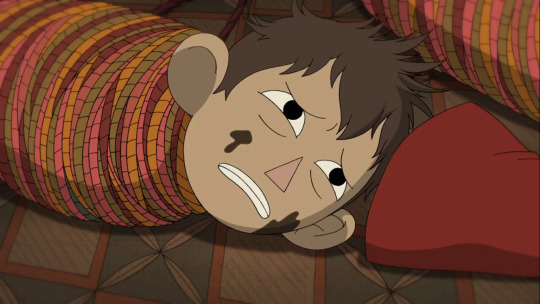
It’s all rain and winter for Wirt until the end of his adventure. But the show isn’t content to leave him even slightly forlorn: when it gets too dark, he has a frog to swallow a lantern to light the way, and when it gets too cold, he has a brother to cover him in leaves, and when he falls, he has Beatrice to help pull him back up. Even the Woodsman tries to save him in his own way (talk about folks who are bad at communication). Bad things happen, and people make mistakes, but the bigger mistake is allowing that to close you off to others, or to never forgive friends that are genuinely sorry. Our heroes have taken the ferry to the other side, and now the story can shift to one about the folly of abandoning all hope.
Where have we come, and where shall we end?
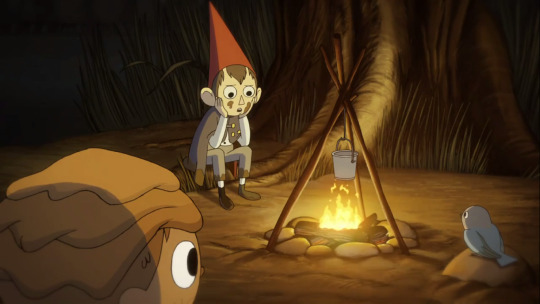
On top of Jason Funderberker, who’s set up as a major rival to make his eventual reveal one of the show’s best jokes, Wirt gives Beatrice a general summary of Into the Unknown three episodes before we see it play out.
#lullaby in frogland#over the garden wall#otgw#steven universally#mark twain#the princess and the frog
64 notes
·
View notes